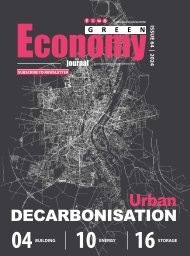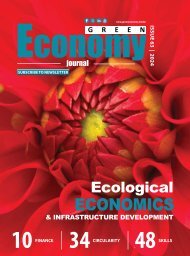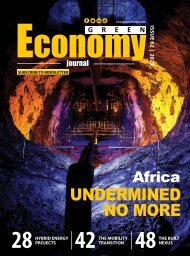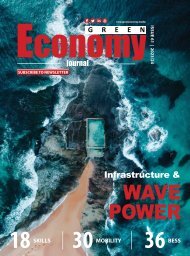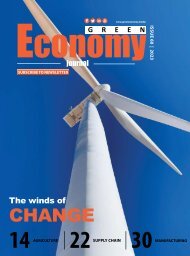Green Economy Journal Issue 39
Create successful ePaper yourself
Turn your PDF publications into a flip-book with our unique Google optimized e-Paper software.
News & Snippets
PLASTICS SA HELPS LAUNCH
WASTE NETWORK
No rush for
renewables
As part of the African Marine Waste Network,
various projects have been initiated around
South Africa to stem the tide of marine pollution.
Although activities are currently coordinated
and managed by the Clean Surf Project, a
South Coast steering committee has been
formed consisting of industry, government and
environmental organisations.
“Launching the KZN Marine Waste Network
South Coast is directly aligned with the aims and
objectives set by the SA Initiative to End Plastic
Waste, i.e. solving the issue of plastic in the
The voice of the public
South Africa is a developing nation, however, advancement in development does not come
without its environmental impacts. Environmental Impact Assessments (EIAs) play an important
role in ensuring the environmental and social impacts are mitigated as much as possible. Equally
as important is including the voice of the public in the EIA process.
Reputation Matters has launched its public participation service to support environmental
practitioners and developers with the public participation process. The purpose of public
participation is to provide a source of information for the public about the EIA and proposed
development. It also allows stakeholders to register as interested and affected parties (I&APs) to
submit their comments, concerns and recommendations.
Public participation is a vital component to the EIA process and will largely influence the
Department of Environmental Affairs’ decision to approve a development based on the EIA.
www.reputationmatters.co.za
February 2020: Minister of Mineral Resources
and Energy Gwede Mantashe cautioned that the
department would not be rushed by renewable
energy lobbyists to open the renewable energy
IPP procurement programme’s bid window 5.
He emphasised that the S34 determinations –
which would allow municipalities to procure
electricity from IPPs – need to first be concurred
with by the energy regulator before this bid
window can be opened.
The National Energy Regulator of South Africa
(NERSA) received two ministerial determinations
enabling Government to procure emergency
and utility-scale projects to address the
electricity deficit plaguing South Africa.
In terms of the legal framework, both
the National Energy Regulator Act and the
Promotion of Administrative Justice Act (PAJA)
require NERSA to observe procedural fairness
and allow for public consultation in its decisionmaking
processes.
Following from this, an expedited publicparticipation
process by NERSA or potentially
even dispensing with the entire publicparticipation
process may be permissible
and necessary to enable a swift response by
Government to close the existing electricity
supply deficit of 30 000MW.
Africa’s move towards solar energy is rapidly underway
According to industry experts, the future scope
of solar energy for Africa is extensive and has
seen exponential growth in the past few years.
The continent has experienced a growth of over
1.8 GW of new solar installations, with 1.4 GW
related to photovoltaic (PV) installations, which
is a considerable increase from the 786MW that
was connected in 2017. In 2016, South Africa
had 1329MW of installed solar power capacity
and this capacity is expected to reach 8400MW
by 2030.
African nations and their respective municipalities
lack the available grid infrastructure
and required funding to upgrade the
existing network or grid. Owing to the lack of
infrastructure upgrades, along with the rising
cost of fuel and electricity, an increasing number
of companies are transitioning to solar. This is
not only to yield the associated returns but to
gain access to reliable power.
Successful implementation of solar is
futile without regional cooperation to enable
expediting the process of implementing solar
under a single framework. As most municipalities
operate completely independently from one
environment. It is significant in its ability to unite
industry partners around a common goal and
we are very excited about the future possibilities
that this project holds. Not only does it offer a
very real environmental solution for reducing
waste in the environment, but it will also have
very positive socio-economic spin-offs for local
communities thanks to future job creation and
youth development. We are truly fortunate to be
part of such a significant initiative,” says Douw
Steyn, Plastics SA.
www.plasticsinfo.co.za
another, this consequently implies that they are
unable to foresee or understand the benefits
or the process of such regional integration
initiatives.
Addressing Africa’s large and persistent
power deficit is key to achieving economic
and social targets. There is significant potential
for solar power, both at the utility and off-grid
scale, to assist in reducing this shortfall. This is
because of the given high solar irradiation in
many countries, as well as the declining price of
PV equipment in recent years.
Governments increasingly see both forms
of solar power as critical to their electrification
objectives. In an endeavour to increase investment
on the continent’s solar front, African ministers are
encouraging international investors to participate
in solar Power Purchase Agreement (PPA)
processes and are empowering them to own and
operate solar farms in their own capacity.
Green Economy Journal - GreenEconomyOnline
greeneconomy.media
5




